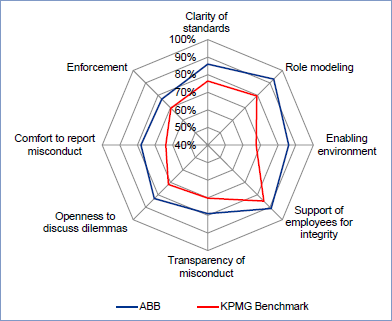Understanding our ethical culture

During July 2013 a global Integrity Culture and Risk Survey was conducted by the professional services firm KPMG AG. Over 24,000 employees responded.
The survey was conducted using a metric called the Integrity Thermometer methodology, which measures integrity on eight different dimensions: clarity, role modeling, enabling environment, support of employees for Integrity, transparency, openness to discuss dilemmas, comfort to report misconduct, and enforcement. These dimensions represent a compass that can guide future initiatives and actions.
As the figure shows, ABB scored above the benchmark on all eight dimensions. In particular, results showed that employees at ABB have a positive perception of the ethical culture within the Group. Role modeling is perceived as most positive, at 93 percent. Employee support for integrity is also high, at 91 percent, showing that employees are motivated to actively uphold ABB’s integrity values.
Transparency, comfort to report misconduct and enforcement are perceived somewhat less positively in comparison with other dimensions but still perform better than the KPMG benchmark of seven other multinational companies.
The outcome from the survey confirmed that ABB has a strong ethical culture, that our communication and training efforts have resonated in the organization, and that the vast majority of employees would report if they saw a concern.
Our Integrity program will continue to play a priority role, and our plan is to continue with these efforts. A culture of integrity is a pre-requisite for a world class business.
Clarity
The degree to which the rules and procedures are accurate, concrete and complete, so employees understand what is expected with regard to ethical conduct within the organization.
Role modeling
The degree to which management sets a good example for the organization and their employees and whether desired organizational behavior of management and supervisors is visible .
Enabling environment
The degree to which organization targets correspond to predetermined values and norms and whether there is sufficient time, resources, information, capacity and authority to realize responsibilities.
Support of employees for integrity
The degree to which management and employees feel motivated to actively uphold organization's interests.
Support of employees for integrity
The degree to which management and employees feel motivated to actively uphold organization's interests.
Openness to discuss dilemmas
The degree to which employees feel comfortable to discuss ethical dilemma’s within the organization and feel comfortable raising and addressing ethics concerns.
Comfort to report misconduct
The degree to which employees are called to account about unethical behavior within the organization and the degree to which management and employees feel comfortable to report misconduct.
Enforcement
The degree to which desired behavior is rewarded and misconduct is enforced and people learn form mistakes and incidents.